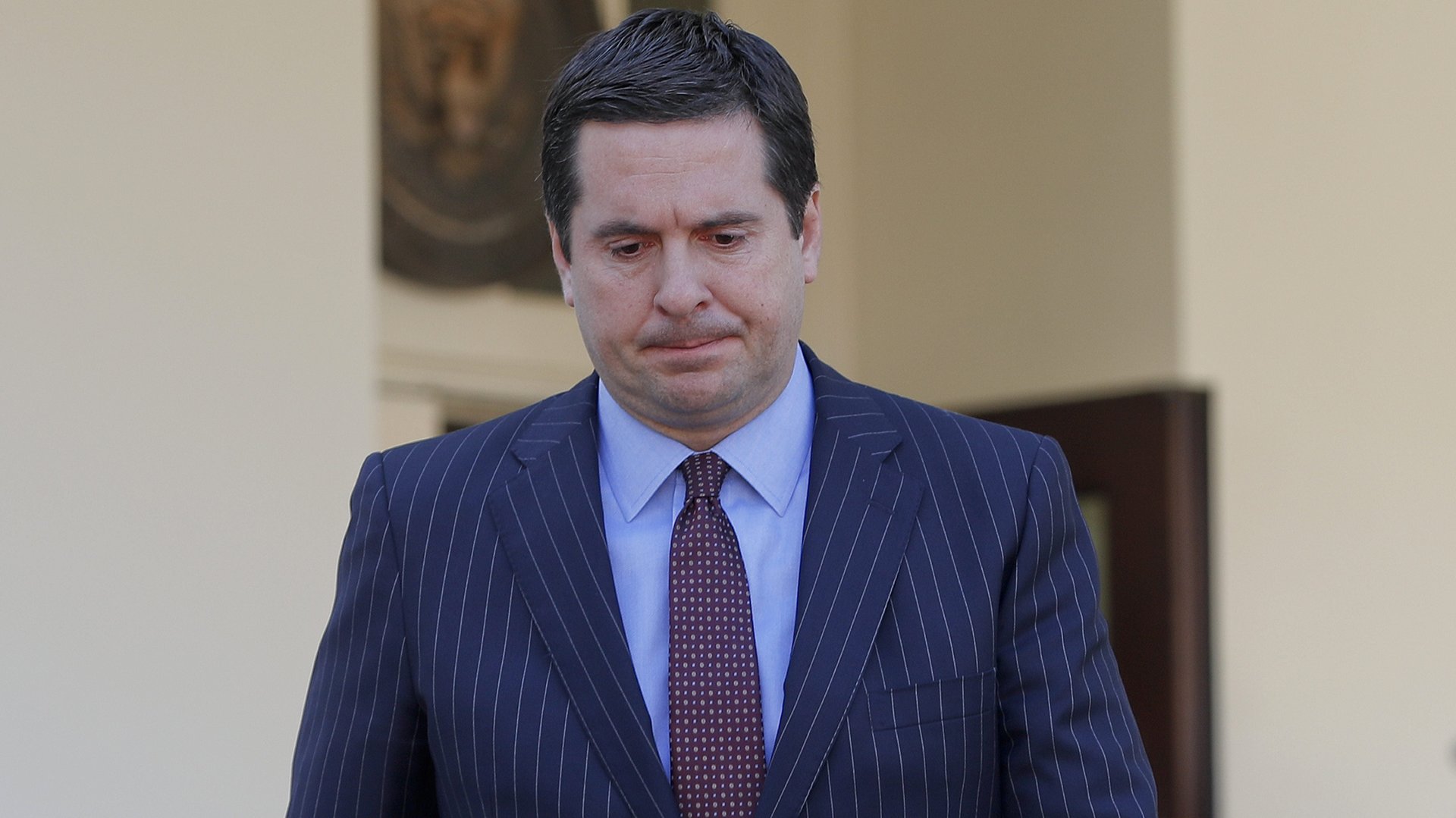All the logical holes in the GOP memo about the Trump dossier
Does a memo released today criticizing the FBI indeed show “serious violations of the public trust,” as its champion, representative Devin Nunes claims? Or is it a pretext for president Donald Trump to upturn the FBI’s top leadership, and ultimately block the agency’s investigation into his campaign’s ties to Russia?


Does a memo released today criticizing the FBI indeed show “serious violations of the public trust,” as its champion, representative Devin Nunes claims? Or is it a pretext for president Donald Trump to upturn the FBI’s top leadership, and ultimately block the agency’s investigation into his campaign’s ties to Russia?
The four-page memo (read it for yourself here) alleges that the FBI was overly reliant on information in the controversial Steele dossier when applying for a warrant to secretly monitor Trump aide Carter Page.
Democrats who have seen the intelligence the memo is based on say the memo tells only part of the story, with what one senator describes as an “astonishing disregard for the truth.” But even without having read that underlying intelligence, there are clear holes in the memo.
Here’s our guide to them:
The memo doesn’t say that the FBI and Department of Justice did anything illegal
The supposed purpose of the memo is to highlight the potential violation of Page’s civil liberties. (Trump’s opponents say it’s an attempt to discredit the FBI’s Russia investigation.) However, the memo never says the application to monitor Carter Page was illegal. Moreover, as USA Today justice reporter Brad Heath points out, even wrongful omissions aren’t enough to stop a warrant being issued when there’s a good case for it.
The memo also claims that the FBI’s application to surveil Page failed to acknowledge that the Steele dossier was funded by Democrats and allegedly biased against Trump—which Schiff, the top Democrat on the House Intelligence Committee, disputes. Whether or not that’s true, the mere fact that Steele dislikes Trump isn’t a legal basis for the application being improper. As the memo itself notes, Steele has a “past record of credible reporting.”
The memo claims that a controversial dossier was used to justify surveillance—but doesn’t say whether the information in it was wrong
The memo says the Steele dossier formed “an essential part” of the warrant application. It bases this on classified testimony given by then-deputy FBI director Andrew McCabe to the House Intelligence Committee.
However, the memo does not publish McCabe’s statement in full and seems worded to avoid saying that the dossier was the reason for seeking the warrant, rather than information in it. It’s unclear whether this information existed elsewhere or had been otherwise corroborated.
The memo separately seems to confirm that the Steele dossier didn’t trigger the Russia investigation as a whole. Instead, it seems to say that an FBI agent started the investigation due to information about another campaign aide, George Papadopoulos.
The memo claims that Steele leaked information to Yahoo News—but again, doesn’t dispute the information itself
The memo takes issue with the fact that the application “cited extensively” a Yahoo News article about Page’s trip to Moscow in July 2016. The memo claims that the article doesn’t corroborate the Steele dossier, since, it alleges, that article was based on a leak from Steele. The authors base this allegation on the fact that Steele has said he met with Yahoo News.
Nevertheless, the memo’s authors don’t dispute any of the reporting in the piece and fail to acknowledge that the speech Page gave in Moscow was in the public domain.
The memo faults the FBI for not firing Steele— over something it didn’t know
Citing the fact that the FBI terminated its relationship with Steele after he spoke to the media, the memo chides the FBI for not having done so earlier (in September). However, the authors themselves point out that the FBI didn’t find out that Steele had been talking to the media until later.
It reveals that the warrant to spy on Carter Page was renewed three times
The memo also reveals that the warrant to surveil Page was renewed three times. As former White House ethics counsel Norm Eisen points out, the Steele dossier’s (potentially biased) provenance was public knowledge by the time the surveillance application was up for renewal, and the court chose to renew it anyway.
Furthermore, if the warrant was renewed three times, the secret court adjudicating the warrant would have had to find that the surveillance was providing valuable information, each time—meaning the basis for the application stood up.
It contains irrelevant innuendo
If the aim of the memo were really to probe alleged violations of Page’s civil liberties, it would focus on Page’s civil liberties.
But the memo crams in irrelevant detail from the Republicans’ various narratives to discredit the larger Russia investigation as possible, like the fact that FBI agent Peter Strzok sent anti-Trump texts to his lover, a fellow FBI employee. Special investigator Robert Mueller removed Strzok from the investigation when he found out about the texts, and a Wall Street Journal analysis of 7,000 messages sent between Strzok and his lover found “no evidence of a conspiracy against” Trump.